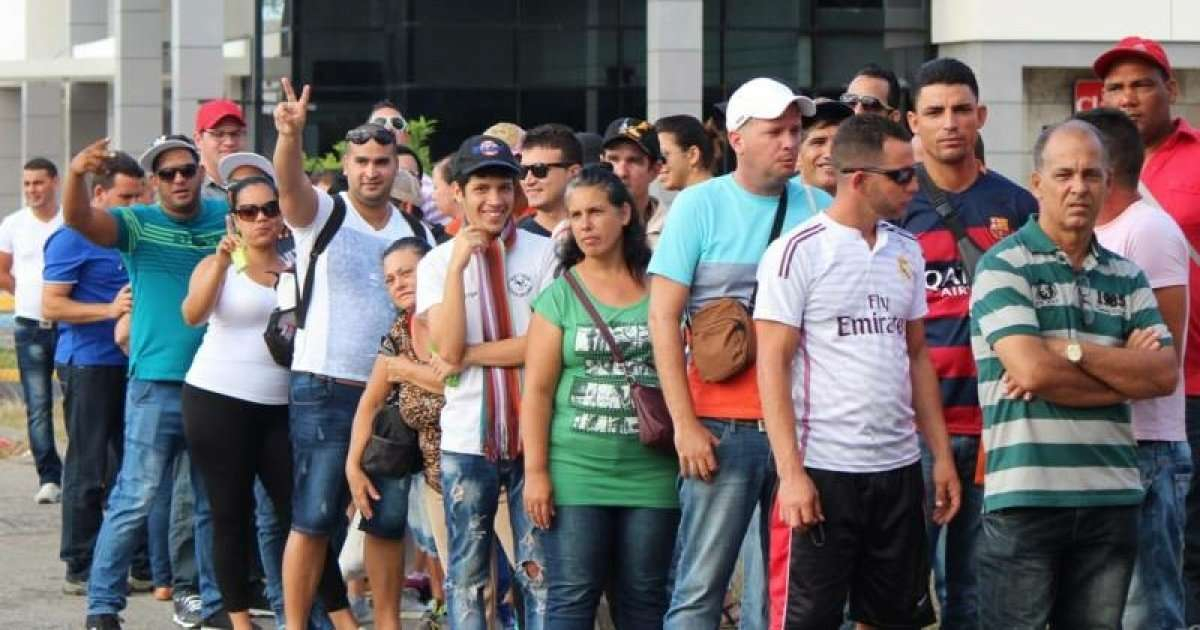
Uruguay denied refuge to 85% of applicationsCuban migrants in that South American country in the first five months of this year, according to research by a local press outlet.
“The Refugee Commission (CORE) denied 89 refugee requests in the first six months of this year, 82 of which were made by Cubans. “At least since 2017, the majority of denied refugee applications are from people of that origin,” an investigative report fromMontevideo Portal.
From January to May, only three Cubans were recognized as refugees by the CORE in Uruguay, the report stated.
The analysis adds that "according to Foreign Ministry sources consulted byMontevideo Portal, the reason why 85% of refugee applicants of Cuban origin receive a denial is because they argue based on their shortcomings.”
“What they say is that they are economic reasons and the economic reasons, when they say it in the interview, are not reasons that justify a refuge,” explained the source from the Uruguayan Foreign Ministry about the reasons why most of the refugees there are denied. refugee requests from Cubans in that country.
However, for Venezuelan citizens the situation is different, the report points out, since in the first five months of this year the Interministerial and Interinstitutional Commission of the Ministry of Foreign Affairs of Uruguay granted refuge to 83 Venezuelans and that organization has not denied even a request from citizens of that country since 2019.
Law 18,076, which regulates refuge in Uruguay, enacted in 2006, establishes that “every person has the right to request and receive refuge in the national territory,” so any person who appears at a Uruguayan border point can request refuge. and the State must process your request, the aforementioned media also points out.
“If a Cuban is granted refugee status, you are acknowledging the part that there is a dictatorial regime in Cuba. So, there is that dilemma that is colliding,” Cuban Jorge Valdés, one of the few admitted as a refugee in that country, stated in the report.
He also said that the CORE “must evaluate the rigidity it has or look with different eyes on a case-by-case basis.”
“Regardless of nationality, the problem is the same. In our case, Cubans, each case is very particular. In my case, when they consulted me in interviews they asked me: did you do political activism in your country? My answer was no. No, in my country you cannot do political activism. There is only one party. I did social activism from my reality, which was my university,” commented Valdés about the reasons why Cubans are so rarely admitted as refugees in that country.
Last February it emerged that 1,454Cubans entered Uruguay in the first two months of 2022,according to data provided by the National Directorate of Migration (DNM) of the South American country.
Although the COVID-19 pandemic and the closure of borders implied a considerable reduction in the number of Cubans who traveled to Uruguay during 2021, the figures for last January and February amounted to more than half of the 2,886 counted last year.
This information was obtained by the Association of Free Cubans in Uruguay and published by the newspaperThe country.
According to that Association, the largest immigrant community in Uruguay is the Cuban one, although there is no updated census on the number of its members; In 2019, however, there were more than 5,000 Cuban citizens in the country.
Data from the Uruguayan Ministry of Foreign Affairs indicates that in 2021 the DNM initiated 1,014 residency procedures for Cubans, a figure only surpassed by the 1,653 Argentines.
In 2020, before the border closures due to the coronavirus pandemic,Refugee applications from Cubans in Uruguay reached a record number of 9,000, even higher than the requests of Venezuelan migrants.
In recent years the numbers of Cubans who have arrived in Uruguay have increased. In 2017, the entry of 4,577 people was reported, in 2018 there were 12,648 and in 2019 they reached almost 20,000.
However, the impact of the pandemic on living conditions and the expectations created with the arrival of Joe Biden to the White House,had a considerable impact on the decision of many Cubans to leave Uruguay and seek to settle in the United States.
During 2021, more Cubans left Uruguay than entered, figures that amounted to 3,529 according to official data.
On the contrary, in the last decade more Cubans arrived in Uruguay than those who left.
By eliminating thedry foot/wet foot policy at the end of the Barack Obama era and controls on immigrants' access to the United States were strengthened during the Donald Trump administration, the so-called "southern route" - from Cuba to Guyana and thenfrom Brazil to Uruguay along the northeast border- became the escape route for many Cubans, according to a report byThe country.
In the first 20 days of last January, 538 Cubans arrived in Uruguay, 345 for Carrasco, 135 for Rivera, 23 for Colonia, 14 for Chuy, four for Fray Bentos, one for Punta del Este and one for Río Branco. But on those same dates, the Uruguayan government's immigration data indicates that 268 Cubans left the country, most of them by air.
The destiny of many Cubans who arrive in Uruguay and other Latin American countries is to continue heading to the United States border.
What do you think?
COMMENTFiled in: